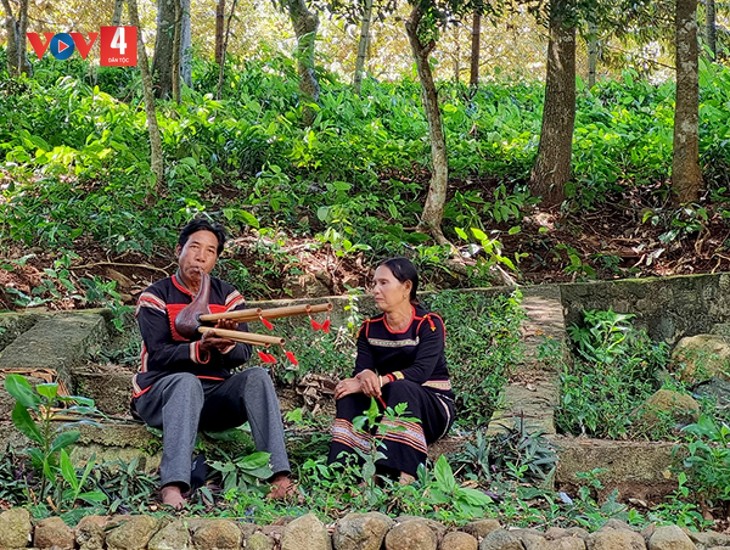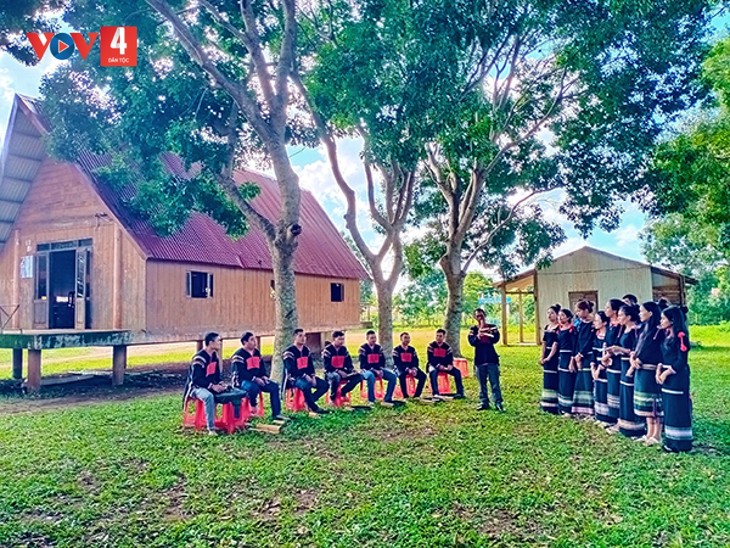(VOVWORLD) - Dak Lak province has been enhancing activities to preserve the culture ofthe Central Highlands’ indigenous groups. Besides classes on gong music and folk singing and dancing, Dak Lak has just opened classes for villagers on epic and rhyme performance.
 Two Ede people practice reciting epics. (Photo: VOV) Two Ede people practice reciting epics. (Photo: VOV) |
Under a canopy of perennial trees at the water source, H Djuon Nie of Ea Tul commune, Cu Mgar district, is reciting an epic she has just learned, about a man named Dam Yi who is associated with the Sah B wharf in the commune. H Djuon said she has been attending an epic performance class since the middle of the year.
“I want to take both the singing and the dancing classes. I’m very happy with the epic singing class and I’ll teach my children what I’ve learned. I hope they’ll have opportunities to learn other genres, such as Ay-ray, Kut, and call-and-response singing.”
The epic singing class organized by the provincial Department of Culture, Sports and Tourism in Ea Tul commune belongs to a project on intangible cultural heritage preservation and promotion in Dak Lak and is sponsored by the International Cooperation Center of Jeollabuk province, South Korea. 30 Ede people in Ea Tul attend the class 3 evenings per week.
Artisan Y Dhin Nie says he learned the epics at an epic singing class taught by Emeritus Artisan Y Wang H Wing in 2004. Since then he has traveled to many places to perform and introduce Ede culture to a wider public.
“I want to preserve the traditional culture of our group that I learned from our predecessors. I teach the students the epic of Dam Yi. If they want to continue studying, I’ll teach them more epics. I hope they’ll teach the epics to others,” Y Dhin Nie said.
 Ede men and women practice call-and-response singing. (photo: VOV) Ede men and women practice call-and-response singing. (photo: VOV) |
A class on rhyming words is being held in Cuor Dang commune, Cu Mgar district. 20 students, who are mostly Ede people, are learning folk literature, performing skills, rhyming words, and popular rhyme songs.
“I learn and then teach my children and grandchildren so they can understand the Kut and Ay-ray genres. The younger generation will continue to preserve the traditions, culture, and customs of the Ede and pass them to their offspring,” said H Tuyet Nie of Cuor Dang commune.
Dak Lak province has opened a class on Arap gong performance and Xoang dancing of the Gia Rai in Ea Sol commune, Ea H’leo distrist. The gong teams and art troupes are given musical instruments and performing costumes. The Department of Culture, Sports, and Tourism has studied and collected gong and rhyme performances of the Ede and published books about it.
Lai Duc Dai, the Department’s Deputy Director, said that with the support of the International Cooperation Center of South Korea’s Jeollabuk province, cultural preservation activities have been effectively implemented. This is the second year Jeollabuk has given 55,000 USD to Dak Lak.
“Jeollabuk province values our collaboration so they’ve increased the funding. They have seen the project’s meaningful results and effectiveness in preserving the gong intangible cultural heritage and other heritages. With the support of Jeollabuk, people are feeling greater responsibility for preserving and promoting their heritages and are trying harder than before,” Dai said.
Dak Lak province has three national intangible heritages: Ede epics, Ede rhyming, and the Longevity ceremony of the M’Nong.